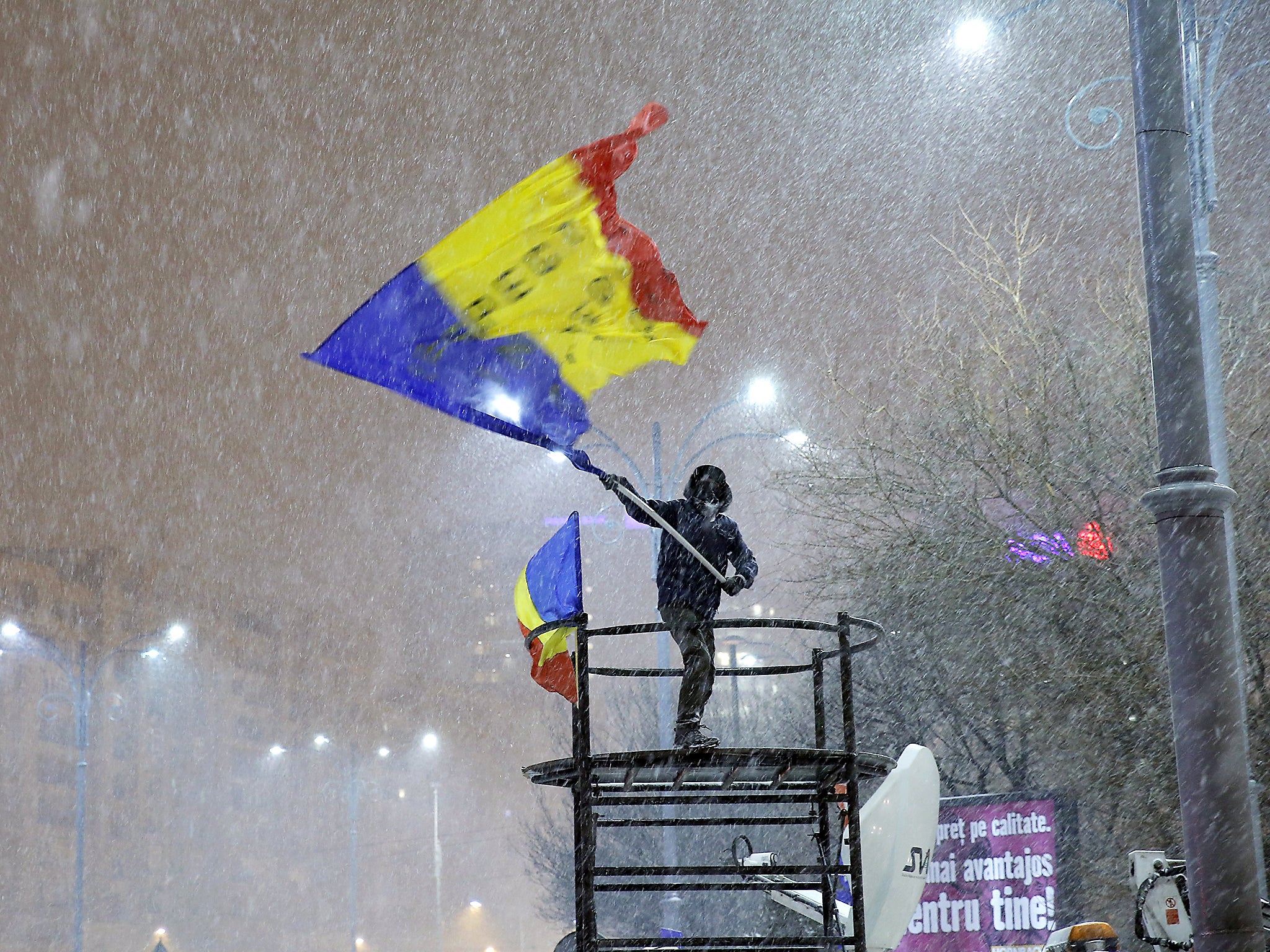Romania protests: Inside the European parliament where the government could collapse at any moment
The eye of the storm: Kit Macdonald meets opposition figures inside the Palace of the Parliament in Bucharest, where anti-government protests have raged outside for nine straight days and no one knows what will happen next

Protesters took to the streets of Bucharest for the ninth night running on Wednesday, with crowds braving heavy snow in the capital’s Piata Victoriei as the country’s ruling Social Democratic Party (PSD) and tens of thousands of people clamouring for its downfall continue to square off. The anti-corruption protests – the largest in Romania since the 1989 revolution – have been good-natured and violence-free, and last night’s gathering of around 7,000 people was in a similar vein.
Protesters chanted: “Day after day, we will stay” and the ubiquitous refrain of “Demisia” (“Resign”), and in a sea of home-made signs one that read: “Grindeanu [Prime Minister Sorin], you should do my washing up” stood out as an encapsulation both of the unceasing good cheer of the protesters and the toll beginning to be wrought on their everyday lives by the nightly protests.
The other political events of the day were relatively routine in the context of what has been an extraordinary week and a half in the EU’s second-poorest country. As expected, the PSD-led government, supported by the junior coalition partner, the Alliance of Democratic Liberals, comfortably survived a parliamentary vote of no confidence in the afternoon, with Mr Grindeanu using a speech to declare that there had been no good reason for the vote to have been held.
The day’s other main development came when President Klaus Iohannis, who has been sympathetic to the anti-graft protests, was booed and shouted at when he briefly tried to initiate dialogue with pro-PSD counter-demonstrators outside Cotroceni Palace.

On Thursday the anti-government “Demisa” protesters had part of their wish granted when Justice Minister Florin Iordache announced he was stepping down. “I’ve submitted my resignation. I say that all that I’ve done was legal,” Mr Iordache told reporters. The ruling Social Democrats will now propose a replacement and submit the name to Mr Iohannis, who has the right to reject it.
Through the whole process, however – the noise and colour of the anti-corruption demonstrators at Piata Victoriei, the speeches and mass walkouts in parliament, the frequently angry scenes at Cotroceni Palace and the often malign and misleading input of the country’s TV news channels – one uniting factor has stood out: nobody, but nobody, knows what is going to happen from here.
As unsure as the rest of the country is Serban Marinescu, a key figure in the new, progressive USR (Save Romania Union), which became parliament’s third-largest party after the recent elections and which backs the anti-corruption protests.
On Wednesday, Marinescu invited The Independent to spend some time in parliament as the day’s events unfolded. In a football pitch-sized colonnaded corridor (the Palace of the Parliament is a 1,100-room testament to former Communist leader Nicolae Ceasescu’s madness, and the world’s second-largest administrative building after the Pentagon) Marinescu hurried over and offered apologies for being so busy, before admitting that he and many others in his party are unclear on quite what they should be doing about the current situation aside from protesting.
“We know what the PSD is doing,” he told me. “We said during the campaign that their major interest is an attack on the judicial system. Now they are doing it and everybody is furious. But the situation is so dynamic and the government is acting so weirdly that we don’t know exactly what to do. We don’t know what to do because they don’t know what to do, so it’s a crazy situation. People are out on the streets but nobody really knows what’s going to happen next. It’s really confusing.”
Many in Marinescu’s party, a movement that sprang from the streets and which has no prior parliamentary experience at all within its ranks, were active during the protests in 2015 that brought down the previous PSD government of Victor Ponta, after a fire in the city’s Colectiv nightclub that killed 64 people. Ponta’s resignation (after which a technocratic government ruled the country for over a year until the elections in December) was achieved with 25,000 people on the streets, whereas last Sunday 250,000 gathered in Piata Victoriei.
So why has this much larger mobilisation so far failed to unseat Grindeanu and his government? “The political situation was a lot more unstable then,” Marinescu says. “Now they have the legitimacy of having recently won the elections, so they feel a lot bolder and are a lot less likely to bow to pressure.”
Where this deadlock between a deeply entrenched political elite and their supporters and a passionate and overwhelmingly youthful movement demanding an end to the rampant corruption that has plagued the country since the fall of communism will end is still anyone’s guess.
Best and worst-case scenarios are the primary conversational currency across Bucharest and the country at the moment, and it’s obvious Marinescu and others like him are minded to take an optimistic view, at least as they look to the medium term. He does see fit to warn of one outcome that he hopes doesn’t come to pass, however.
“The PSD are a populist party, and they’ve been emboldened by the strides made elsewhere by populist parties and movements. The good thing about them right now, though, is that, although they are populists and nationalists, they are not extremists. They are pro-European and generally pro status-quo because that’s what suits their agenda best.
"We’re all hoping that there doesn’t come a time when they decide they need to transform their party into an extremist, anti-European group like Orban’s Fidesz in Hungary, because if that happens then we’re screwed.”
Join our commenting forum
Join thought-provoking conversations, follow other Independent readers and see their replies
Comments
Bookmark popover
Removed from bookmarks